ISF Filing with Quota Restrictions: Simplified Steps for Importers
ISF Checklist || 800-219-0294 || contact@isfchecklist.com || www.isfchecklist.com
Today's video delves into the concept of Understanding ISF Filing for imports with quota restrictions. International trade is a key component of the global economy, requiring importers to navigate complex customs procedures. The Importer Security Filing, or ISF, is a crucial part of this process for ocean imports into the United States.
The ISF filing is mandatory and requires importers or their authorized agents to provide shipment information to the US Customs and Border Protection (CBP) before cargo is loaded onto the vessel. This filing allows the CBP to assess any potential security risks associated with the cargo.
When dealing with imports that have quota restrictions, the ISF filing becomes more complex. Quota restrictions are imposed on specific goods to manage import quantities, often to protect domestic industries or control trade balances.
To understand ISF filing for imports with quota restrictions, the first step is to identify if your goods fall under any quota limitations. The Harmonized Tariff Schedule (HTS) can provide this information.
Once quota restrictions are confirmed, you must obtain the necessary quota documentation from the appropriate government agency. This documentation will vary based on the specific goods and countries involved.
Accuracy and completeness are essential when handling quota documentation. Every detail should be carefully reviewed to avoid discrepancies or errors that could cause delays, penalties, or cargo denial.
With accurate quota documentation, you can proceed with the ISF filing process. Timely and precise information, including the shipper's and consignee's details, goods description, country of origin, and HTS code, must be provided to the CBP.
It is important to note that the ISF filing for quota-restricted imports should be done separately and in addition to any other required customs filings, such as the entry summary.
Staying updated on changes or modifications to quota restrictions for imported goods is crucial. Quota limits and guidelines can change periodically, so it is important to maintain a proactive approach and monitor updates from relevant government agencies.
Understanding ISF filing for imports with quota restrictions is essential for successful and compliant customs clearance. By following these steps and staying informed, customs brokers and importers can navigate international trade complexities more efficiently. Thank you for watching today's video, and stay tuned for more valuable insights and tips on customs brokerage. #ISFfiling #quotarestrictions #customsbrokerage #imports #internationaltrade
-
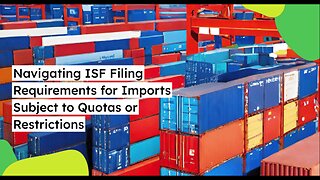 4:28
4:28
ISF Expedite
1 month agoUnderstanding ISF Filing for Goods Subject to Import Quotas or Restrictions: Key Considerations
1 -
 4:14
4:14
ISF Solution
25 days agoUnlocking the Secrets of Customs Quotas and Entry Filing for Imported Cars
3 -
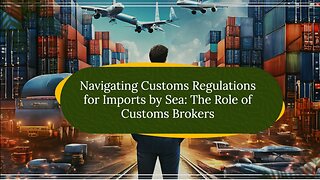 4:22
4:22
ISF Solution
1 month agoThe Essential Guide to Customs Brokers: Navigating Import Regulations Made Easy!
1 -
 5:38
5:38
ISF Solution
28 days agoSimplifying ISF Requirements for Manufacturing Equipment Importers
1 -
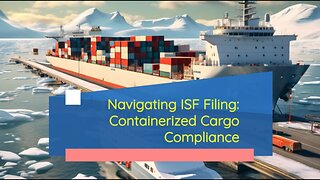 7:12
7:12
ISF Solution
1 month agoISF Requirements for Container Shipments
3 -
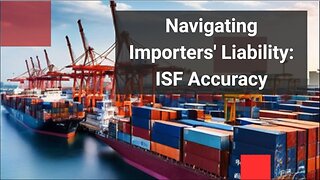 4:33
4:33
ISF Solution
1 month agoImporters' Responsibility for ISF Compliance
9 -
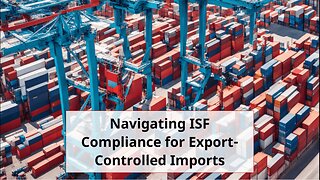 9:49
9:49
ISF Solution
1 month agoEnsuring ISF Compliance: Imports Subject to Export Controls
1 -
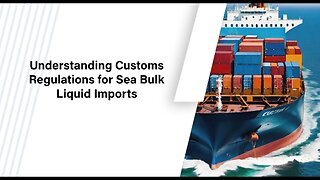 4:43
4:43
ISF Solution
1 month agoThe Expert Guide to Customs Regulations for Imports by Sea Bulk Liquid Transport
1 -
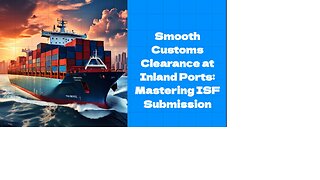 4:07
4:07
ISF Depot
1 month agoISF Submission Demystified: Navigating Inland Ports for Import Success
3 -
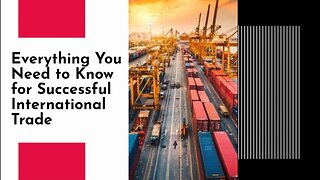 3:06
3:06
License To Import
1 month agoStay Compliant with Importer Security Filing and Unlock Smooth Customs Clearance
6